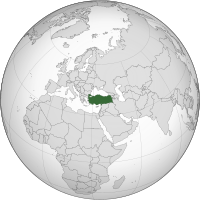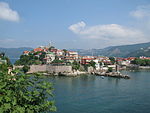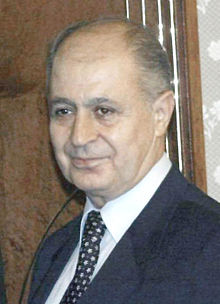Portal:Turkey: Difference between revisions
Updated portal using Template:Transclude random excerpt, which provides readers with current, up-to-date information that is verbatim to that in articles. A consensus approving the usage of transclusion templates in portals was formed at this Village Pump discussion. Used suitable selections moved here from Portal:Turkey/Culture & its subpages |
Removed: {{/box-header|Culture, arts, cuisine|Portal:Turkey/Culture|}} {{/Culture}} {{Box-footer}}. See talk page for more information. |
||
| Line 192: | Line 192: | ||
{{/box-header|Selected place|Portal:Turkey/Selected place|}} |
{{/box-header|Selected place|Portal:Turkey/Selected place|}} |
||
{{/Selected place}} |
{{/Selected place}} |
||
{{Box-footer}} |
|||
{{/box-header|Culture, arts, cuisine|Portal:Turkey/Culture|}} |
|||
{{/Culture}} |
|||
{{Box-footer}} |
{{Box-footer}} |
||
Revision as of 14:15, 4 April 2020
| This portal or section is in a state of significant expansion or restructuring. You are welcome to assist in its construction by editing it as well. If this portal has not been edited in several days, please remove this template. If you are the editor who added this template and you are actively editing, please be sure to replace this template with {{in use}} during the active editing session. Click on the link for template parameters to use.
This page was last edited by Northamerica1000 (talk | contribs) 4 years ago. (Update timer) |
Merhaba! Welcome to the Turkey portal
 | |

| |
Turkey, officially the Republic of Türkiye, is a country mainly located in Anatolia in West Asia, with a smaller part called East Thrace in Southeast Europe. It borders the Black Sea to the north; Georgia, Armenia, Azerbaijan, and Iran to the east; Iraq, Syria, and the Mediterranean Sea to the south; and the Aegean Sea, Greece, and Bulgaria to the west. Turkey is home to over 85 million people; most are ethnic Turks, while ethnic Kurds are the largest ethnic minority. Officially a secular state, Turkey has a Muslim-majority population. Ankara is Turkey's capital and second-largest city, while Istanbul is its largest city and economic and financial center. Other major cities include İzmir, Bursa, and Antalya.
Turkey was first inhabited by modern humans during the Late Paleolithic. Home to important Neolithic sites like Göbekli Tepe and some of the earliest farming areas, present-day Turkey was inhabited by various ancient peoples. The Hattians were assimilated by the Anatolian peoples, such as the Hittites. Classical Anatolia transitioned into cultural Hellenization following the conquests of Alexander the Great; Hellenization continued during the Roman and Byzantine eras. The Seljuk Turks began migrating into Anatolia in the 11th century, starting the Turkification process. The Seljuk Sultanate of Rum ruled Anatolia until the Mongol invasion in 1243, when it disintegrated into Turkish principalities. Beginning in 1299, the Ottomans united the principalities and expanded; Mehmed II conquered Istanbul in 1453. During the reigns of Selim I and Suleiman the Magnificent, the Ottoman Empire became a global power. From 1789 onwards, the empire saw a major transformation, reforms, and centralization while its territory declined.
In the 19th and early 20th centuries, persecution of Muslims during the Ottoman contraction and in the Russian Empire resulted in large-scale loss of life and mass migration into modern-day Turkey from the Balkans, Caucasus, and Crimea. Under the control of the Three Pashas, the Ottoman Empire entered World War I in 1914, during which the Ottoman government committed genocides against its Armenian, Greek, and Assyrian subjects. Following Ottoman defeat, the Turkish War of Independence resulted in the abolition of the sultanate and the signing of the Treaty of Lausanne. The Republic was proclaimed on 29 October 1923, modelled on the reforms initiated by the country's first president, Mustafa Kemal Atatürk. Turkey remained neutral during most of World War II, but was involved in the Korean War. Several military interventions interfered with the transition to a multi-party system.
Turkey is an upper-middle-income and emerging country; its economy is the world's 17th-largest by nominal and 12th-largest by PPP-adjusted GDP. It is a unitary presidential republic. Turkey is a founding member of the OECD, G20, and Organization of Turkic States. With a geopolitically significant location, Turkey is a regional power and an early member of NATO. An EU candidate, Turkey is part of the EU Customs Union, CoE, OIC, and TURKSOY.
Turkey has coastal plains, a high central plateau, and various mountain ranges; its climate is temperate with harsher conditions in the interior. Home to three biodiversity hotspots, Turkey is prone to frequent earthquakes and is highly vulnerable to climate change. Turkey has a universal healthcare system, growing access to education, and increasing levels of innovativeness. It is a leading TV content exporter. With 21 UNESCO World Heritage sites, 30 UNESCO intangible cultural heritage inscriptions, and a rich and diverse cuisine, Turkey is the fifth most visited country in the world. (Full article...)
Selected article -
Doner kebab (UK: /ˈdɒnər kɪˈbæb/, US: /ˈdoʊnər kɪˈbɑːb/; Turkish: döner or döner kebap, pronounced [dœˈnæɾ keˈbɑp]), also spelled as döner kebab, is a dish of Turkish origin made of meat cooked on a vertical rotisserie. Seasoned meat stacked in the shape of an inverted cone is turned slowly on the rotisserie, next to a vertical cooking element. The operator uses a knife to slice thin shavings from the outer layer of the meat as it cooks. The vertical rotisserie was invented in the 19th-century Ottoman Empire, and dishes such as the Arab shawarma, Greek gyros, Canadian donair, and Mexican al pastor are derived from this.
The modern sandwich variant of döner kebab originated and was popularized in 1970s West Berlin by Turkish immigrants. This was recognized by the Berlin-based Association of Turkish Doner Manufacturers in Europe in 2011. (Full article...)
List of selected articles
|
|---|
Featured picture

Lake Abant National Park (Turkish: Abant Gölü Milli Parkı), established on 10 June 2022, is the 48th national park in Turkey. It is located in Mudurnu district of Bolu Province, northwestern Anatolia. (Full article...)
History, people, places
| This page is currently inactive and is retained for historical reference. Either the page is no longer relevant or consensus on its purpose has become unclear. To revive discussion, seek broader input via a forum such as the village pump. |
| Note: Article entries are now being transcluded directly on the main portal page. However, this page should be retained for historical reference. |

The Great Seljuq Empire (Modern Turkish: Büyük Selçuklu Devleti; Persian: دولت سلجوقیان) was a medieval Turkish empire, originating from the Qynyq branch of Oghuz Turks.
The Seljuq Empire controlled a vast area stretching from the Hindu Kush to eastern Anatolia and from Central Asia to the Persian Gulf. From their homelands near the Aral sea, the Seljuqs advanced first into Khorasan and then into mainland Persia before eventually conquering eastern Anatolia.
The Seljuq empire was founded by Tughril Beg in 1037 after the efforts by the founder of the Seljuq dynasty, Seljuq Beg, back in the first quarter of the eleventh century. Seljuq Beg's father was in a higher position in the Oghuz Yabgu State, and gave his name both to the state and the dynasty. The Seljuqs united the fractured political scene of the Eastern Islamic world and played a key role in the first and second crusades. Read more...
Art
| This page is currently inactive and is retained for historical reference. Either the page is no longer relevant or consensus on its purpose has become unclear. To revive discussion, seek broader input via a forum such as the village pump. |
| Note: Article entries are now being transcluded directly on the main portal page. However, this page should be retained for historical reference. |

Embroidery is the art or handicraft of decorating fabric or other materials with needle and thread or yarn. Embroidery may also incorporate other materials such as metal strips, pearls, beads, quills, and sequins.
A characteristic of embroidery is that the basic techniques or stitches of the earliest work—chain stitch, buttonhole or blanket stitch, running stitch, satin stitch, cross stitch—remain the fundamental techniques of hand embroidery today.
Machine embroidery, arising in the early stages of the Industrial Revolution, mimics hand embroidery, especially in the use of chain stitches, but the "satin stitch" and hemming stitches of machine work rely on the use of multiple threads and resemble hand work in their appearance, not their construction. Read more...
Did you know...
- See Portal:Turkey/Did you know/Archive for all DYK listings.
Featured at Did you know section at the Wikipedia's Main Page
- ...that the Mosque of the Rose in Istanbul is so named because on the day of the Fall of Constantinople the building was adorned with garlands of roses?
- ...that SantralIstanbul, an art museum in Istanbul, Turkey, is located in what was the first power station of the Ottoman Empire?
- ...that the Romanian crude oil tanker MT Independența burnt for weeks in 1979 after colliding with a freighter?
- ...that Wilhelm von Pressel designed the first railroad in Turkey?
- ...that the 1621 Battle of Khotyn resulted directly in the death of the Polish–Lithuanian Commonwealth leader, hetman Jan Karol Chodkiewicz, and indirectly in the death of the Ottoman Empire commander, sultan Osman II?
- ...that the Crusade of Varna required simultaneous attacks on the Muslim Ottoman Empire by Christian Hungary and the Muslim Karamanids, which did not take place?
Selected biography -
Ahmet Necdet Sezer (Turkish pronunciation: [ah'med nedʒ'det se'zæɾ]; born 13 September 1942) is a Turkish statesman and judge who served as the tenth president of Turkey from 2000 to 2007. Previously, he was president of the Constitutional Court of Turkey from January 1998 to May 2000. The Grand National Assembly of Turkey elected Sezer as president in 2000 after Süleyman Demirel's seven-year term expired. He was succeeded by Abdullah Gül in 2007.
Following his legal career, Sezer became a candidate for the presidency with the joint support of many political parties in Parliament. Following the 2000 presidential election, he took an ardent secularist approach on issues such as the headscarf, holding the view that secularism in Turkey was under threat. A quarrel between Sezer and Prime Minister Bülent Ecevit in 2001 led to a financial meltdown, attributed to the weakness of the coalition government as well as to the large debt owed to the International Monetary Fund. (Full article...)
Selected video
Selected place
| This page is currently inactive and is retained for historical reference. Either the page is no longer relevant or consensus on its purpose has become unclear. To revive discussion, seek broader input via a forum such as the village pump. |
| Note: Article entries are now being transcluded directly on the main portal page. However, this page should be retained for historical reference. |

Amasra (from Greek Amastris Ἄμαστρις, gen. Ἀμάστριδος) is a small Black Sea port town in the Bartın Province, Turkey. The town is today much appreciated for its beaches and natural setting, which has made tourism the most important activity for its inhabitants. As of 2010[update], the population was some 6,500.
Amasra has two islands: the bigger one is called Büyük ada (Great Island) while the smaller one is called Tavşan adası (Rabbit Island).
More to read about Amasra
Turkey News
- April 27: Over 10,000 attend Gallipoli dawn service for ANZAC Day centenary
- January 31: Millions march in France and around the world in support of Charlie Hebdo
- December 20: Istanbul court acquits bomb accused Pinar Selek for fourth time
- December 18: Nation mourns, world condemns Taliban attack on Pakistan army school
- June 29: Medal-seeking Spanish men arrive at 2014 Goalball World Championships
- June 27: Russians continue to top podium on third day of European Deaf Swimming Championships
- June 26: Belgian men's goalball team departs for Finland for World Championships
- June 25: Russians top podium on second day of European Deaf Swimming Championships
Quotes
| This page is currently inactive and is retained for historical reference. Either the page is no longer relevant or consensus on its purpose has become unclear. To revive discussion, seek broader input via a forum such as the village pump. |
| “ | Gözden uzak olan gönülden de uzak olur. (Who is far from the eye will also be far from the heart.) | ” |
Some articles worth reading
Turkish wikipedia
 |
|
Related portals
Religions in Turkey
Neighbouring countries
Countries with related heritage
Wikimedia
The following Wikimedia Foundation sister projects provide more on this subject:
-
Commons
Free media repository -
Wikibooks
Free textbooks and manuals -
Wikidata
Free knowledge base -
Wikinews
Free-content news -
Wikiquote
Collection of quotations -
Wikisource
Free-content library -
Wikiversity
Free learning tools -
Wikivoyage
Free travel guide -
Wiktionary
Dictionary and thesaurus












